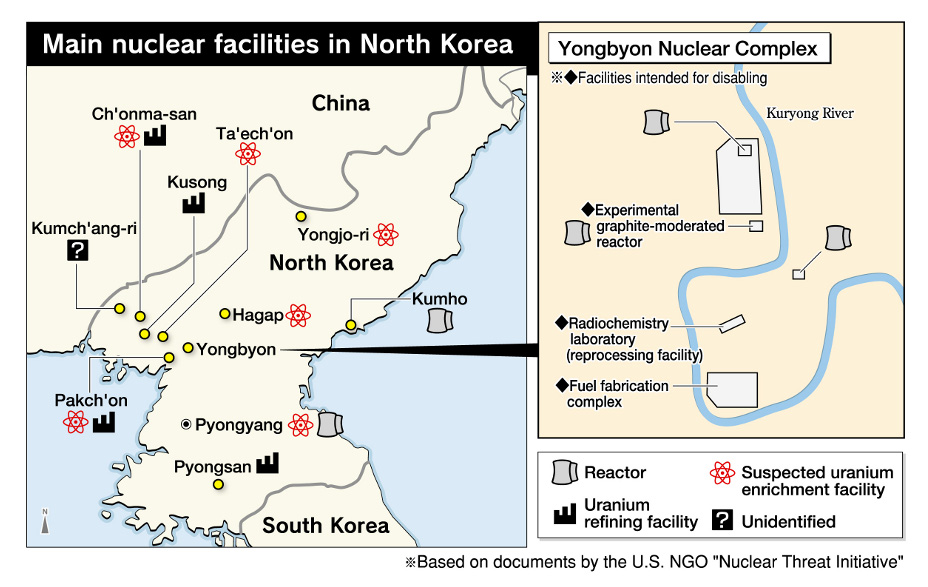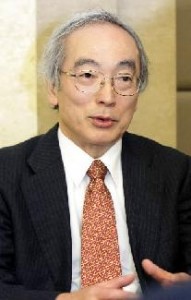Nuclear weapons can be eliminated: Special Series, Part 6
Jan. 6, 2010
Special Series: The Day the Nuclear Umbrella is Folded
Part 6: Six-party talks to promote dialogue for renouncing nuclear weapons
by the "Nuclear Weapons Can Be Eliminated" Reporting Team
Northeast Asia, including the A-bombed nation of Japan, has remained, to this day, in a Cold War state. The region has never been able to extricate itself from the predicament of a vicious circle of power struggles. At the center of this dilemma lies North Korea. The first session of the six-party talks was held in 2003, but six years later the talks continue to stray off course. North Korea has adopted a "diplomacy of brinkmanship," which has foiled the efforts of the five other nations and led to the failure to halt that nation's nuclear weapons development program. In order to persuade North Korea to abandon its nuclear ambitions, the six nations have no choice but to make concerted efforts to regain trust among themselves. Japan, still dependent on the "nuclear umbrella" for its security, is faced with the challenge of reviewing its policies and taking appropriate action.
"Security" is key to North Korea returning to the talks
Stephen Bosworth, the U.S. special representative for North Korea policy, was busy traveling through Northeast Asia in early December, with the aim of encouraging North Korea, which has chosen to leave the six-party talks, to return to the framework. Through the Korean Central News Agency, North Korea later issued the statement that "The nations involved in the talks have reached a shared recognition for the resumption of the talks."
The six-party talks have been at a standstill for nearly a year. During this time, North Korea has conducted nuclear tests and launched missile tests. With the nation proceeding in a direction contrary to renouncing nuclear arms, the effectiveness of U.S. attempts to reverse this trend should be weighed.
"North Korea exhausted its tactics when it conducted the nuclear tests in May. Since then, it has shifted toward dialogue," said Yuji Fukuhara, an associate professor at the University of Shimane and an expert on the Korean Peninsula. Professor Fukuhara believes the six-party talks will likely resume, though the key is found in the stance taken by the other five nations.
History shows, though, that the resumption of dialogue must not become a goal unto itself.
For instance, North Korea's agreement in 2007 to disable its nuclear facilities illustrates this point. Disabling its nuclear facilities was considered the first step toward the nation's irreversible denuclearization, and North Korea indeed destroyed some parts of these facilities in 2008, including a cooling tower. Nevertheless, the collapse of the talks led to North Korea resuming its nuclear development efforts. As a result, the Federation of American Scientists (FAS) estimated that, as of October 2009, North Korea possesses "less than 10 nuclear warheads."
"North Korea seeks nuclear weapons for its self-defense," said Professor Fukuhara. "It feels its national security and the preservation of its regime have not been assured. It will be hard to achieve the denuclearization of North Korea unless the United States and Japan approach the nation from the perspective of assuring its national security." In other words, unless the United States and Japan, which relies on U.S. nuclear weapons, change their stance, North Korea will be unlikely to change its own.
What are the latest moves on the part of the United States? In mid-November, President Barack Obama visited South Korea and stressed that the United States "will not repeat its past patterns" in regard to its talks with North Korea over denuclearization.
Around the same time, in response to questions from reporters, Secretary of State Hillary Clinton directed a message to North Korea while on a visit to Afghanistan. She stated that if North Korea renounced its nuclear weapons, the United States would respond with three measures: First, by normalizing diplomatic relations between North Korea and the United States; second, by concluding a peace accord in place of the termination accord of the Korean War; and third, by providing the nation with economic assistance.
The order of the three measures mentioned by Ms. Clinton indicates a delicate shift in stance. In the past, the United States had deemed economic assistance a higher priority, but this time it was referenced third, thus lowering its importance to some degree. It can be understood, from this context, that the United States will attach greater significance to the two other measures.
At an international symposium held in Hiroshima in early December, Jeong Se-Hyun, former minister of the Unification Ministry of South Korea, alluded to this shift.
"North Korea seeks a peace accord and the assurance of its regime by the United States, above economic assistance," Mr. Jeong stated. "That is the objective of North Korea's nuclear development program, which is being used as a bargaining chip." He added, "If these are guaranteed, North Korea would disband its nuclear development program."
In May 2010, the Nuclear Nonproliferation Treaty (NPT) Review Conference will be held at United Nations Headquarters in New York. Can the international community achieve some results in regard to North Korea's nuclear issue before the conference opens? A positive outcome would have an impact not only on nuclear disarmament and nonproliferation in Northeast Asia but in the world at large.
Challenges and future prospects for the six-party talks: Interview with Yoshiki Mine, former chief representative of Japan for Normalization Negotiations with North Korea
The Chugoku Shimbun spoke with Yoshiki Mine, who served as chief representative of Japan for Normalization Negotiations with North Korea from 2007 to April 2009, on the challenges and future prospects for the six-party talks. Below are Mr. Mine's profile and his comments.
Yoshiki Mine
Yoshiki Mine was born in Hyogo Prefecture in 1943. After graduating from the Faculty of Law at the University of Tokyo in 1968, he joined Japan's Ministry of Foreign Affairs, where his posts included Permanent Representative and Ambassador of Japan to the Conference on Disarmament as well as Ambassador for the Global Environment. Mr. Mine has served as a distinguished research fellow at the Canon Institute for Global Studies since May 2009.
Time to review U.S. policies
The six-party talks are beneficial as a forum for multinational dialogue, but they have failed repeatedly in denuclearizing North Korea, their primary objective. Based on this history, I suggest that it's time to review the nature of the talks.
North Korea's demands seeking the preservation of its regime and the assurance of its national security have remained consistent. However, the United States, which North Korea fears most, has dubbed North Korea a member of the "axis of evil" and has been poised to resort to a nuclear attack if it feels the situation requires such a strike. As a result, despite the fact that North Korea has been taking part in the six-party talks, the nation continued developing nuclear weapons behind the scenes.
A shift in U.S. policy is the key. It is essential that North Korea be granted the "Negative Security Assurance," a guarantee that a nation will not be attacked by nuclear weapons if it renounces the possession of nuclear arms. In the six-party talks held in 2005, the United States pledged not to attack North Korea with nuclear weapons, but the statement was not accompanied by any formal assurance. North Korea will not trust such a promise unless it is legally binding. The basis behind North Korea's desire to possess nuclear weapons must first be removed.
Peace accord for the Korean War
The Korean War, which still remains in a circumstance of cease-fire, must be ended. To start this process, the United States and North Korea should conclude a peace accord which incorporates the Negative Security Assurance. That would make the assurance legally binding, leading to improved relations between the two countries. China, too, would welcome the move, as the nation is uneasy about North Korea's nuclear weapons.
Nuclear deterrence fuels a vicious circle
Japan and South Korea must also change. North Korea views their current security policy of relying on the U.S. nuclear umbrella as a grave threat, with the two nations fortified with the nuclear capability of the superpower at their backs.
It's true that Japan is hemmed in by the nuclear powers of China and Russia. But unless Japan exerts initiative in moving toward getting out from under the nuclear umbrella, North Korea will never renounce its nuclear weapons. If Japan and other nations continue to stick to nuclear deterrence, their stance can be used as an excuse for the United States not to alter its nuclear strategy. The United States can argue that "our allies want to be protected by nuclear arms."
Ultimate goal is normalizing diplomatic relations
While the six-party talks are mired in a standstill, the response to North Korea is limited to applying "pressure" by imposing sanctions. Unless the path toward dialogue is resumed, relations based on trust in Northeast Asia will never be built.
Establishing bilateral diplomatic relations between Japan and North Korea, and the United States and North Korea, must be considered the ultimate goal. Even if North Korea appears denuclearized, the nations involved will remain concerned whether North Korea has truly lived up to its promise to disarm and whether it might eventually resume its nuclear development activity. If the nations involved can engage in direct dialogue with North Korea, beyond simply talk of technical verification, this would be a productive setting. Such relations would reinforce mutual transparency, leading to the formation of a new framework for security in the region.
Keywords
Six-party talks
The six-party talks is a framework for a multilateral dialogue involving Japan, the United States, China, Russia, South Korea and North Korea with the intention of resolving concerns over North Korea's nuclear weapons development. China serves as chair. The first session was held in August 2003. In September 2005, a joint declaration incorporating such statements as the renouncing of North Korea's nuclear program was adopted, but the framework virtually collapsed in December 2008 due to differences involving the verification methods. North Korea announced its withdrawal from the talks and the resumption of its nuclear weapons development in April 2009, and then conducted nuclear tests in May 2009.
Disabling nuclear facilities
Following the suspension of operations and the sealing of nuclear facilities in Yeongbyeon, North Korea, the next step involves disabling the facilities. These facilities include: an experimental graphite-moderated reactor, a fuel fabrication complex and a radiochemistry laboratory (reprocessing facility). The move was incorporated in the agreement of the six-party talks concluded in February 2007, along with the pledge by North Korea that it would declare all its nuclear development activities. Christopher Hill, then U.S. assistant secretary of state, stated, "The objective is to make the facilities unusable for at least one year."
(Originally published on December 27, 2009)
To comment on this article, please click the link below. Comments will be moderated and posted in a timely fashion. Comments may also appear in the Chugoku Shimbun newspaper.









